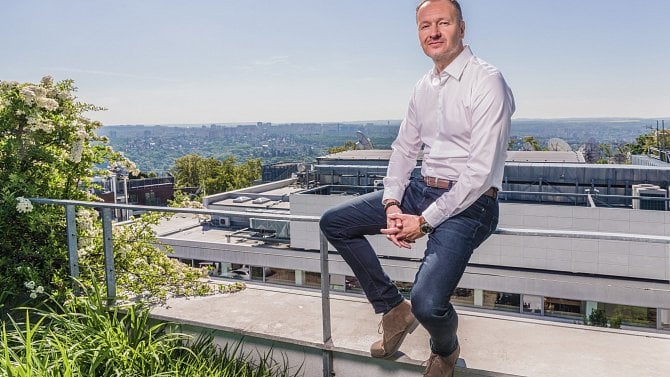There was no escaping that campaign. In the spring, Nova TV paid for billboards in the Czech Republic and Slovakia to promote its Voyo paid internet video library. No sooner had one campaign ended than another began - this time promoting a particular show, the miniseries Iveta. The three-part dramatic series about the early years of singer Iveta Bartosova's career has become one of the most successful shows Voyo offers.
Voyo calls similar shows made just for Voyo the Voyo Original. They include the miniseries The Případ Roubal and Guru, the comedy series Národní házená, and the current premiere of Jitřní záře, a gripping story about an alternative family that wants to name a child according to their own rules. Coming up in the fall are Král Šumavy and the comedy novelty Guma.
"All the Voyo Originals are working extremely well for us. But the backbone is still Ordinace v růžové zahradě. The fact that we dared to flip it in the fall of 2021 from a linear broadcast, where it was still doing 900,000 to a million viewers on one broadcast day, helped us. It showed the market that we were serious. The series hasn't gone down in quality, length or cast, it's still the same. Rather, it has caught a second wind," says Daniel Grunt, CME's Chief Digital Officer.
It's a testament to the strength of the series Ordinace that, unlike other series, it doesn't take the usual summer break. Instead, it will launch a new sequel every week.
How to determine success
While Nova keeps track of how many viewers have watched a particular show, the more important metric is the number of subscribers gained. The total number of subscribers comfortably surpassed the 350,000 mark in the spring. The broadcaster will not publish more precise figures, as no video library on the market publishes similar business data. However, subscribers are growing faster than Nova itself expected.
"We are doing fundamentally better than we planned and dreamed. But we are not accelerating production plans because the ones originally announced were ambitious themselves,"
Grunt points out.
CME's management's mission is clear: to acquire one million paying users in the Czech and Slovak markets by 2026. So far, it looks like a realistic task. "But there is a huge question mark about what the economy will look like next year or in two years," reminds the head of CME's digital activities. Coincidentally, recently published surveys suggest that Czech households will start cutting back on culture, entertainment and other leisure activities.
In addition to how many people have paid for access to Voyo, TV stations are also interested in average viewing time. On average, users now spend 12 hours a week watching shows. Nova commissions various surveys that show Voyo has the highest proportion of users who watch daily or several times a week compared to competing services. Typical users are households of people in their thirties and forties, and Voyo has a greater representation of women compared to linear TV.
Betting on localism
No local service will ever have the budget of the global players. The annual investment by Netflix or Walt Disney in content production is in the tens of billions of dollars. Even if all the TV stations in the Czech market put their production budgets together, they wouldn't pay the equivalent of one American series. That's why Voyo highlights local themes, popular local actors and a wide library of domestic cinema. It has about 750 Czech films on offer.
However, the arrival of Disney+, HBO Max and other global apps on the Czech market also presents a complication when buying content from abroad. The biggest hits are jealously guarded by American production studios, who want to have exclusive films and series on their own platforms.
"So we are reaching out a little bit differently than the American film studios. For example, Scandinavian crime films work very well for us. We have quite a lot of interesting series from the UK, from the BBC and ITV. That's something that works here, so we'll keep going after interesting European work,"
Grunt hints at a buying strategy.
"In all the countries where CME operates, we want to be the strongest local service of first choice for people who want to watch quality local content. Whether it's movies, series, or some shows, reality shows, whatever else. That's the place we want to occupy in the market," he explains.
"The biggest focus and investment at CME is on Voyo. It is the backbone of the entire digital transformation of CME in all the countries where we operate. Voyo cuts across the structure of TV stations, basically almost all teams. Then it automatically transforms the whole company," Grunt continues. "Voyo may have been around for 11 years, but it went through waves where it was a priority, then again it wasn't, it was in a drawer and AVOD - a free archive of shows with video advertising - was being pushed. With the arrival of a new owner, it's become a key priority for the group again," he explains.
Voyo has a different position in Slovenia, where they have developed paid content all the time, while they don't have a free archive with ads at all. "Slovenia is very much a pay-TV market, they monetise all long-form content through Voyo. It's a small market with two million inhabitants, but they developed Voyo and grew continuously. In all other markets, the Voyo curve was flat for a long time, it didn't move for maybe ten years," recalls the director of digital activities.
In the Czech Republic, Voyo's development has been very fast. "We are still learning. As it grows quickly under our hands, we often forget to realise that we have only been working on it for a little over a year," concludes Daniel Grunt. CME wants to use the experience gained for other markets.
Source: lupa.cz

